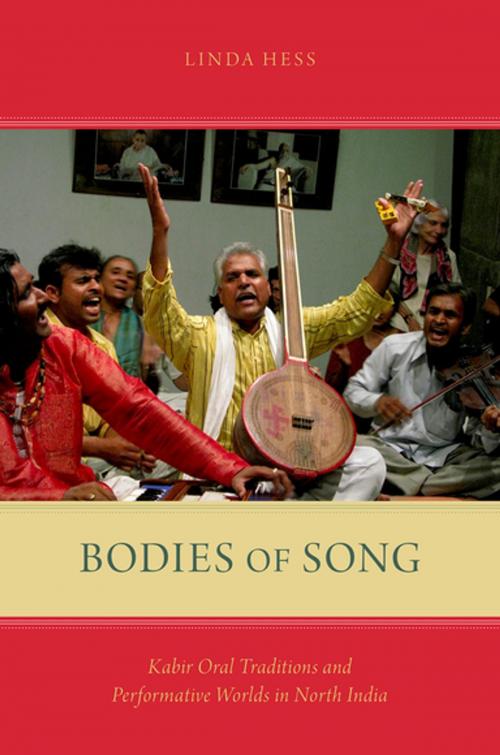Bodies of Song
Kabir Oral Traditions and Performative Worlds in North India
Fiction & Literature, Literary Theory & Criticism, Asian, South & Southeast Asian, Nonfiction, Religion & Spirituality, Eastern Religions, Hinduism| Author: | Linda Hess | ISBN: | 9780190273170 |
| Publisher: | Oxford University Press | Publication: | July 13, 2015 |
| Imprint: | Oxford University Press | Language: | English |
| Author: | Linda Hess |
| ISBN: | 9780190273170 |
| Publisher: | Oxford University Press |
| Publication: | July 13, 2015 |
| Imprint: | Oxford University Press |
| Language: | English |
Kabir was a great iconoclastic-mystic poet of fifteenth-century North India; his poems were composed orally, written down by others in manuscripts and books, and transmitted through song. Scholars and translators usually attend to written collections, but these present only a partial picture of the Kabir who has remained vibrantly alive through the centuries mostly in oral forms. Entering the worlds of singers and listeners in rural Madhya Pradesh, Bodies of Song combines ethnographic and textual study in exploring how oral transmission and performance shape the content and interpretation of vernacular poetry in North India. The book investigates textual scholars' study of oral-performative traditions in a milieu where texts move simultaneously via oral, written, audio/video-recorded, and electronic pathways. As texts and performances are always socially embedded, Linda Hess brings readers into the lives of those who sing, hear, celebrate, revere, and dispute about Kabir. Bodies of Song is rich in stories of individuals and families, villages and towns, religious and secular organizations, castes and communities. Dialogue between religious/spiritual Kabir and social/political Kabir is a continuous theme throughout the book: ambiguously located between Hindu and Muslim cultures, Kabir rejected religious identities, pretentions, and hypocrisies. But even while satirizing the religious, he composed stunning poetry of religious experience and psychological insight. A weaver by trade, Kabir also criticized caste and other inequalities and today serves as an icon for Dalits and all who strive to remove caste prejudice and oppression.
Kabir was a great iconoclastic-mystic poet of fifteenth-century North India; his poems were composed orally, written down by others in manuscripts and books, and transmitted through song. Scholars and translators usually attend to written collections, but these present only a partial picture of the Kabir who has remained vibrantly alive through the centuries mostly in oral forms. Entering the worlds of singers and listeners in rural Madhya Pradesh, Bodies of Song combines ethnographic and textual study in exploring how oral transmission and performance shape the content and interpretation of vernacular poetry in North India. The book investigates textual scholars' study of oral-performative traditions in a milieu where texts move simultaneously via oral, written, audio/video-recorded, and electronic pathways. As texts and performances are always socially embedded, Linda Hess brings readers into the lives of those who sing, hear, celebrate, revere, and dispute about Kabir. Bodies of Song is rich in stories of individuals and families, villages and towns, religious and secular organizations, castes and communities. Dialogue between religious/spiritual Kabir and social/political Kabir is a continuous theme throughout the book: ambiguously located between Hindu and Muslim cultures, Kabir rejected religious identities, pretentions, and hypocrisies. But even while satirizing the religious, he composed stunning poetry of religious experience and psychological insight. A weaver by trade, Kabir also criticized caste and other inequalities and today serves as an icon for Dalits and all who strive to remove caste prejudice and oppression.















